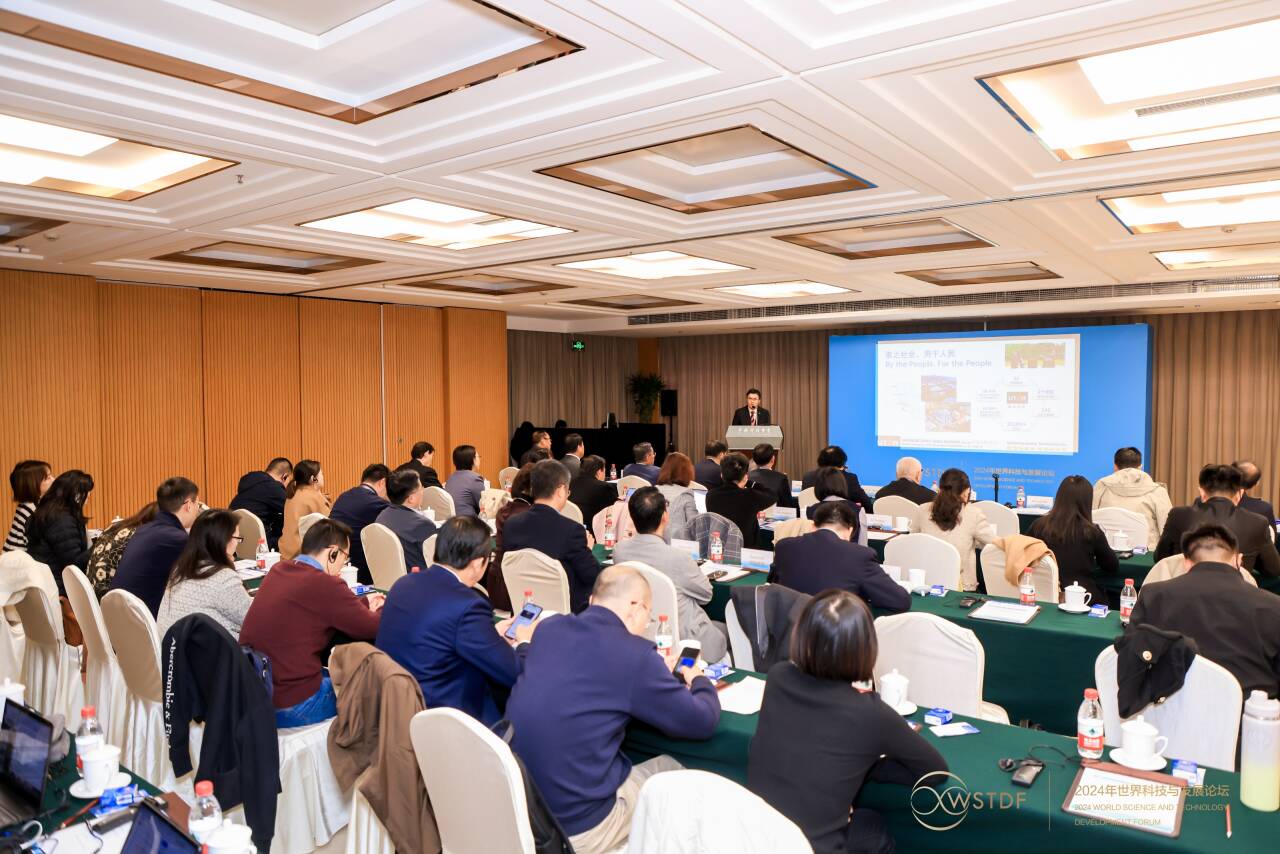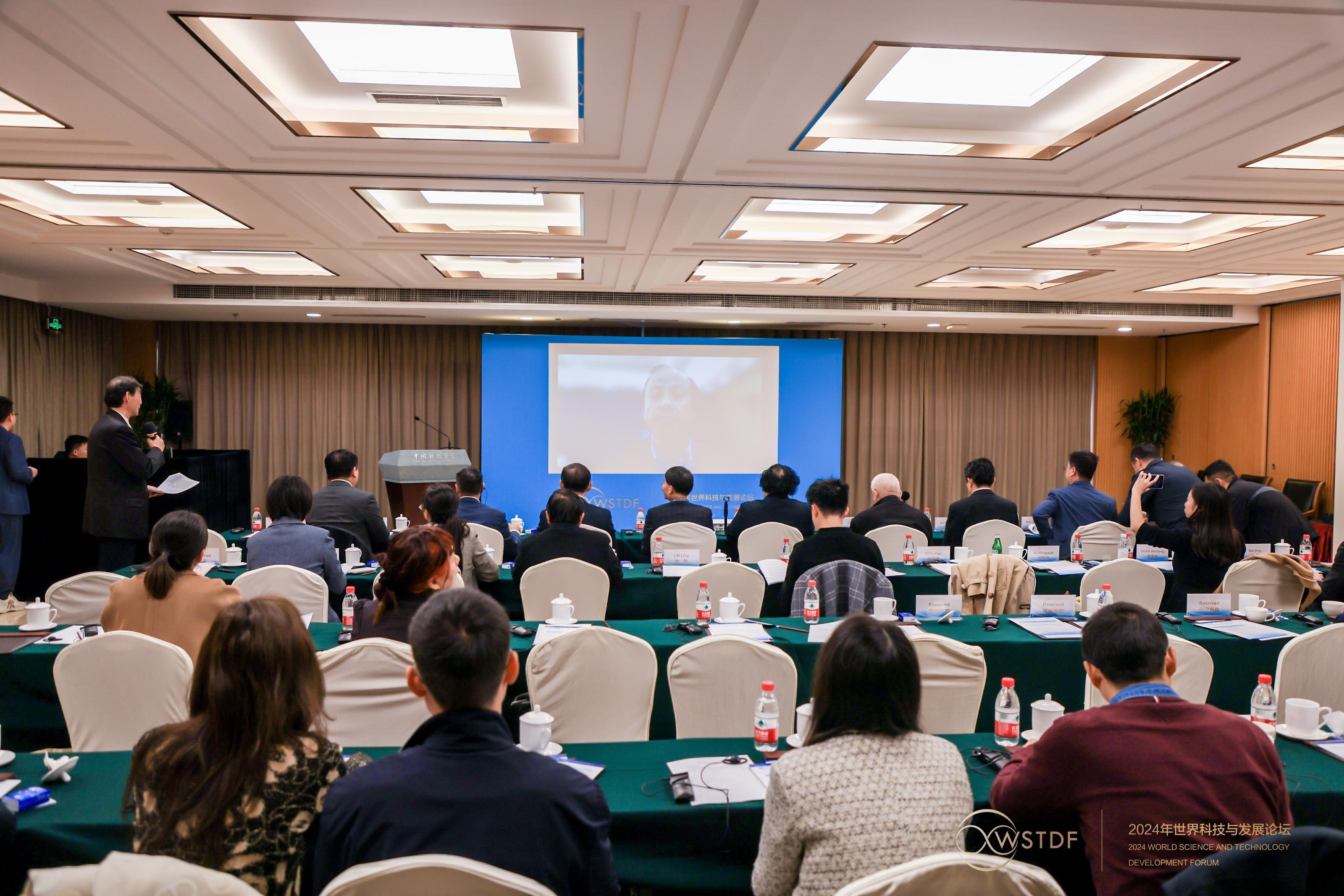
 0 Comment(s)
0 Comment(s) Print
Print E-mail China.org.cn, October 31, 2024
E-mail China.org.cn, October 31, 2024The 2024 World Science and Technology Development Forum (WSTDF) held a thematic session in Beijing on Oct. 24 focused on "Cross-Industry Resource Collaboration and Integration to Provide Innovative Application Scenarios for Enhancing the Intelligent Manufacturing Industry." Leaders, scholars and business representatives from around the globe took part in the event, with the aim of sharing global insights to promote collaboration across industries and drive innovation in intelligent manufacturing.
The session was hosted by the China Association for Science and Technology, organized by the International Coalition of Intelligent Manufacturing, supported by the Beijing International Science and Technology Exchange Center and co-organized by the ASEAN Federation of Smart Industry.

Attendees take part in the "Cross-Industry Resource Collaboration and Integration to Provide Innovative Application Scenarios for Enhancing the Intelligent Manufacturing Industry" thematic session at WSTDF 2024, Beijing, Oct. 24, 2024. [Photo courtesy of WSTDF]
Participants in the event agreed that intelligent manufacturing is crucial to the global technological revolution and industrial transformation. They emphasized the importance of intelligent, green and integrated industrial manufacturing for sustainable global progress.
Lu Daming, vice president of the Chinese Mechanical Engineering Society (CMES), said: "Efficiently integrating cross-sector resources and innovating in intelligent manufacturing applications are crucial for enhancing manufacturing competitiveness and facilitating a transformation toward smarter, greener and service-oriented operations." Lu also highlighted the CMES's ongoing efforts to foster an open, collaborative and mutually beneficial innovation ecosystem to address the challenges within the intelligent manufacturing sector.
Chee Fai Tan, president of the ASEAN Federation of Smart Industry, stressed the growing importance of cross-sector collaboration in today's globalized world. China, a global leader in resources, has made substantial strides in intelligent manufacturing, offering valuable insights to ASEAN countries, he said. Tan urged increased cooperation among nations to drive innovation in the intelligent manufacturing industry by exploring new application scenarios.
Several business leaders shared their experiences on how they are transforming manufacturing to be smarter, greener and more sustainable.
Zhan Jingtao, vice president of Siemens (China), illustrated the immense potential of intelligent manufacturing in achieving carbon neutrality and sustainable development. "Our CNC factory in Nanjing has significantly boosted production efficiency and product quality by blending virtual design with real-world application, increasing factory efficiency by 20%, flexibility by 30%, and reducing time-to-market by 20%, while cutting CO2 emissions by 3,300 tons annually," he said.
Ni Yueyong, director of environmental affairs at Mitsubishi Electric (China) Co. Ltd., shared the company's successful journey toward efficient carbon neutrality. By integrating production, energy and environmental management systems, Mitsubishi Electric has optimized its operations and reduced its carbon footprint. The company has transformed seven of its Chinese factories into national-level green factories, with one achieving zero carbon emissions in 2021. Ni emphasized the significance of efficient carbon neutrality, which combines environmental sustainability with economic benefits, and encouraged wider adoption of the approach.
Zhu Shiming, chief engineer at Phoenix Contact Asia-Pacific Nanjing Co. Ltd., discussed how the company is helping businesses, especially small- and medium-sized enterprises, reap the benefits of digital transformation. By improving digital infrastructure and data quality, the company is enabling businesses to overcome obstacles in industrial and factory applications.
The session also highlighted the critical roles of international cooperation and talent development in advancing the industry. Henry Adamson, an academician of the European Academy of Sciences and chief scientist at the Guangdong Greater Bay Area Institute of Integrated Circuit and System, emphasized the need for greater international collaboration, particularly through talent exchange programs, to propel technological advancements. "China must create more innovation platforms to attract and cultivate top scientific and technical professionals," he stated.
"Technological exchange transcends borders," said Lee Chean Chung, chairman of the Malaysia-China Technology Promotion Association, noting that international forums on technological development are vital for fostering cooperation.
He emphasized the importance of establishing mechanisms for mutual benefit and moving beyond zero-sum thinking: "Only by elevating the living standards of all humanity can we truly achieve maximum benefits."
Lee said that the Belt and Road Initiative has strategically supported technological collaboration between China and Malaysia. He also noted that China's three global initiatives — the Global Development Initiative, Global Security Initiative and Global Civilization Initiative — provide an extensive framework for technological cooperation.
Goi Bok Min, vice president for internationalisation and academic development at the Universiti Tunku Abdul Rahman, stressed the importance of integrating both hard and soft skills in education to meet the demands of the 21st century. He highlighted the university's role in designing industry-aligned courses and promoting hands-on learning to enhance student skills, further supported by joint research initiatives with prominent academic institutions to foster innovation.

Yang Huayong, chairman of the International Coalition of Intelligent Manufacturing, presents the forum's consensus statement at WSTDF 2024, Beijing, Oct. 24, 2024. [Photo courtesy of WSTDF]
At the conclusion of the session, Yang Huayong, chairman of the International Coalition of Intelligent Manufacturing, presented the forum's consensus statement. It stressed the pivotal role of intelligent manufacturing in driving the new global scientific and technological revolution and industrial transformation. "We must expand the application scenarios for intelligent manufacturing, embrace sustainable development principles, and foster cross-sector resource integration to collaboratively enhance the new quality productive forces," the statement declared.
Go to Forum >>0 Comment(s)